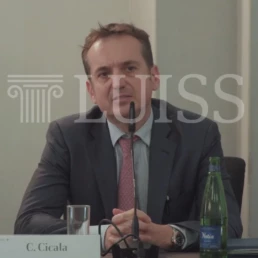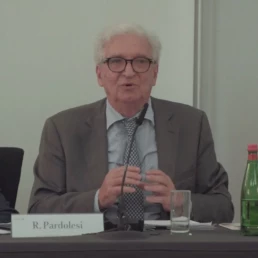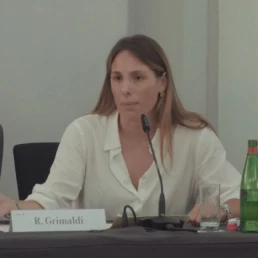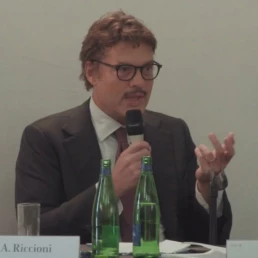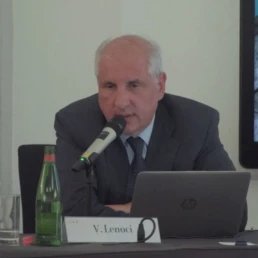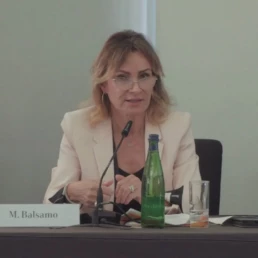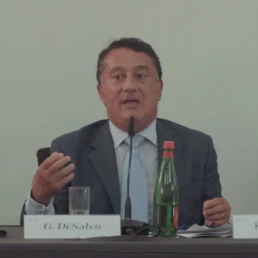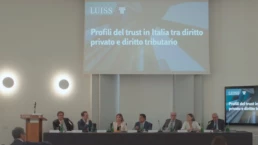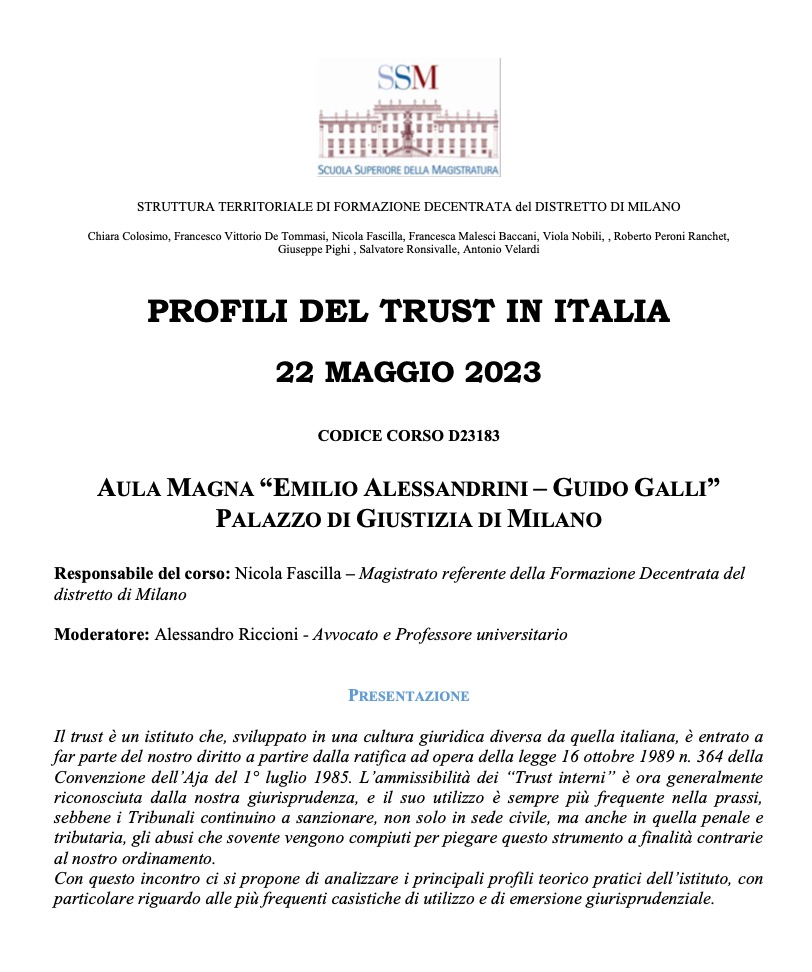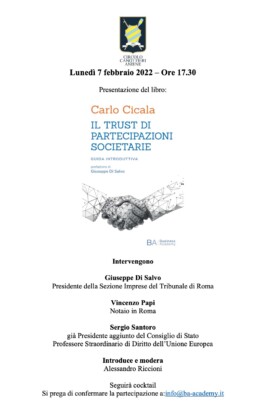Carlo Cicala, The Dynasty Trust
Presentation by Carlo Cicala at the conference “Profiles of Trusts in Italy between Private Law and Tax Law” held at Luiss “Guido Carli” University on 6 July 2023. The event was introduced by Dr Giuseppe Di Salvo, President of the Business Section of the Rome Court, and chaired by Professor Francesco di Ciommo.
Carlo Cicala, The Dynasty Trust
Carlo Cicala presented on "The Dynasty Trust" in the Emilio Alessandrini-Guido Galli Hall at the Milan Palace of Justice, as part of the conference "Profiles of Trust in Italy" organized by the Higher School of the Judiciary. The event was introduced by Dr. Carla Romana Raineri, President of the First Civil Section of the Milan Court of Appeal, and moderated by Alessandro Riccioni.
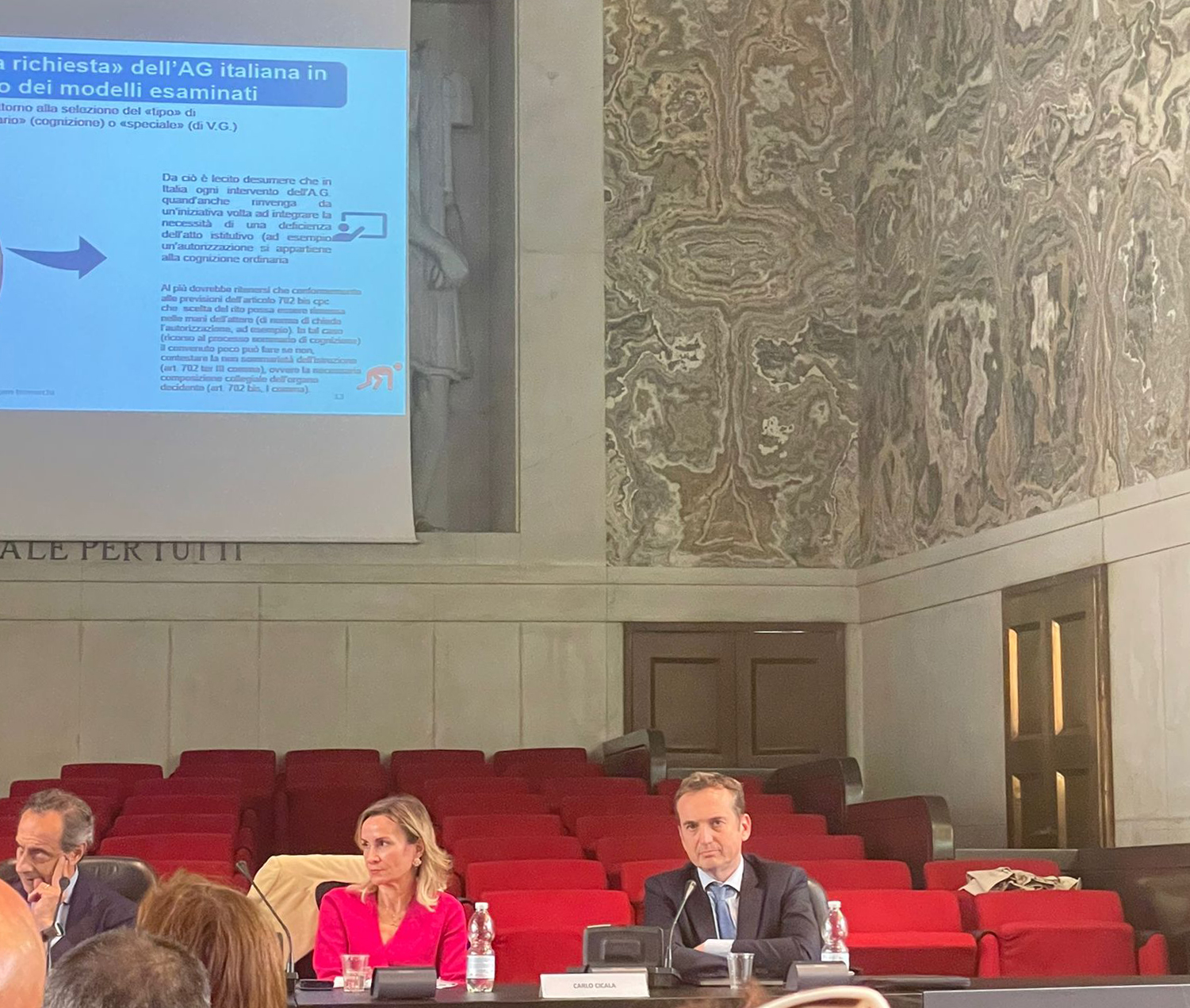
Italian Revenue Agency: Transfer of Assets into a Trust is not subject to Proportional Tax
Circular 34/E of the Italian Revenue Agency, issued on October 20, 2022, provided important clarifications on the taxation of trusts, acknowledging, among other things, that the transfer of assets to the trustee is not subject to immediate proportional tax.
With this, the Agency has definitively aligned itself with the position of the Court of Cassation, disregarding its earlier determinations.
The Circular, however, in stating that the tax is deferred until the assets exit the trustee's estate and enter that of the beneficiary, specifies that if the beneficiaries are identifiable and have fully enforceable rights from the establishment of the trust, proportional taxation can occur at the time the trust is funded.
The complex set of guidelines expressed in the Circular outlines a comprehensive framework for the taxation of trusts in Italy, highlighting the importance of proper planning and management to ensure the trusts' compliance with the tax regulations.
Carlo Cicala, Dynasty Trust Presentation
Circolo Canottieri Aniene, 7th February 2022
I would like to extend my gratitude to President Di Salvo for his introduction, President Santoro for his insightful presentation, and my dear friends Notary Papi and Alessandro Riccioni. I also thank all of you for dedicating your time and the Club for hosting me.
Today, I shall discuss a particularly interesting aspect of generational business transfer through the use of trust, specifically when a business is owned by a company.
The challenge here is straightforward: an entrepreneur identifies a family member deemed most suitable to succeed them in running the business and plans the transfer of company shares.
This transfer can be effected using various instruments, not solely a trust. The simplest and most well-known is the will, or succession due to death. However, the primary issue with a will is the uncertainty regarding the timing of death, hence the succession and generational transfer timeline remains unpredictable.
Conversely, donation offers a definitive date for the generational transfer, occurring while the entrepreneur is alive.
Yet, both wills and donations face the problem of safeguarding the legitimate rights. Typically, there is a designated successor to lead the company, but other family members are entitled to a portion of the entrepreneur’s estate. It is crucial to arrange matters so that the other family members (legitimate heirs) have no reason to contest the generational transfer, thus avoiding succession disputes. Theoretically, this problem can be solved by ensuring that the entrepreneur allocates monetary assets (or other assets besides company shares) to the other family members, ensuring no one feels their rights are violated quantitatively.
However, this problem is further complicated by the fact that, under our legal system, calculations to determine if a legitimate share has been infringed are made posthumously, taking into account the value of assets at the time of death. This can create discrepancies, as the business may have significantly appreciated in value since it was donated or since the will was made, potentially leading to judicial disputes.
Hence, in 2006, the family agreement was introduced as a new tool. With the family agreement, all benefits of donation are realized as the productive asset transfer occurs immediately, while the entrepreneur is still alive, with an additional advantage: if executed according to the law, the transfer of shares cannot be contested at the time of death. Assets transferred via the family agreement are not subject to reduction provided all those entitled to a share of the entrepreneur’s legitimate estate participate in the agreement, including other family members who are not recipients of the family business. These family members must be compensated for their legitimate share calculated based on the business’s value at the time the agreement is signed, thereby theoretically preventing future inheritance disputes.
Nonetheless, the family agreement presents a significant problem: the immediate transfer of the business also requires the immediate satisfaction of other family members’ (non-recipients of the business) shares, which might not be feasible at the time. This leads to situations where the business transfer is appropriate, but the timing for compensating other family members is not, potentially delaying until the entrepreneur’s death.
For these reasons, the family agreement has seen limited use, a result that has disappointed those who invested significant effort into its study.
Thus, we turn to the trust for company shares. Through this instrument, an entrepreneur can transfer company shares to a trustee, who will then transfer them to the designated successor at a future date, possibly upon the occurrence of specific conditions (e.g., reaching adulthood, completing studies), and even after the entrepreneur’s death.
How does this reconcile with protecting legitimate heirs? While the family agreement offers exemption from reduction, a trust provides another possibility. The trustee can be tasked with satisfying the legitimate heirs’ claims from the trust’s assets, calculating the required amounts at the time of the entrepreneur’s death. In simpler terms, the entrepreneur may not know the exact amount needed to satisfy the reserved quotas when establishing a dynasty trust, as it depends on the value of the assets at the time of succession. The trustee would handle these calculations and distributions, thereby eliminating potential succession disputes from the root.
Fiscal Instruments: Exemption from Indirect Taxes
Having discussed the civil law mechanism, let’s address the equally important practical issue: taxation.
Our legal system aims to facilitate the generational transfer of businesses from a tax perspective. In 2006, alongside the family agreement, a significant total exemption from succession and donation tax was introduced for all business transfers to certain family members.
This exemption applies only to the transfer of businesses or controlling shares of a company. According to tax regulations, it is insufficient to simply transfer controlling shares; the transferred company must effectively control a business. For example, transferring 100% of a holding company that only controls 20% of an operating company (and conducts no other business activities) does not qualify for the exemption.
This clarification is crucial because without the exemption, the generational transfer of company shares via trust is subject to indirect taxes (succession tax), albeit with allowances for family transfers (e.g., between father and son).
Importantly, no indirect tax applies at the time of the asset’s transfer into the trust. This was conclusively established only last August, when the Revenue Agency conceded to jurisprudence, affirming that with a trust, indirect taxes are payable only when the asset enters the beneficiary’s estate, not when it enters the trustee’s estate.
Direct Taxes: Transparent and Opaque Trusts
Regarding direct taxes, it is essential to understand that while the trust has tax subjectivity, certain peculiarities must be acknowledged, especially in a generational trust context.
Dividend tax does not always fall on the trust, as one might logically assume. The trustee, as the shareholding entity, would presumably pay the dividend tax. However, the Revenue Agency’s established practice is that, in some cases, the tax falls on the trust beneficiary, regardless of whether the beneficiary has received the income. This occurs in what is termed a “transparent trust,” where the beneficiary has the right to receive the trust’s income, and taxes on dividends from shares fall on the beneficiary.
Conversely, in an “opaque trust,” where the beneficiary does not have an immediate right to income, and the trustee has discretionary power over income distribution, the tax falls on the trust. This scenario arises when the trustee is expected to evaluate the beneficiary’s needs for disbursements (e.g., educational expenses, medical procedures), and the subsequent income transfer to the beneficiary is tax-exempt.
A particular case worth mentioning is an opaque trust engaging in commercial activities, such as investments in other shares. Such a trust enjoys a 95% exemption on the taxable base, with any subsequent income transfer to the beneficiary remaining tax-exempt.
Conclusion: The Role of Fiscal Practices in Trust and Beyond
In conclusion, I have extensively discussed the fiscal profile of trusts, emphasizing its dominance in both volume and importance.
This focus stems from several reasons. Firstly, the fiscal profile of any act is always crucial, including real estate transactions. However, the trust involves an additional complexity, as it incorporates foreign legal principles into our system through an international convention.
The trust is well-known to our judges, both ordinary and tax judges, as well as the fiscal authorities. These authorities play a critical role in defining the fiscal effects of trusts, often leading to discrepancies between the civil and fiscal interpretations of the trust, as evidenced by the Revenue Agency’s previous stance that property transfers into a trust are subject to proportional tax—a position corrected by subsequent jurisprudence.
In practice, the Italian fiscal system frequently views economic operations differently from the civil law perspective, a trend not unique to trusts. For example, a share transfer perceived as such in civil law might be recharacterized as a business transfer for tax purposes, or a purchase transaction might be deemed “non-existent” only for tax purposes, attributing the purchase to a different party.
Furthermore, our tax system includes a general anti-abuse rule, allowing any economic operation to be disregarded if it lacks valid economic reasons beyond tax savings. This can lead to a trust being deemed fiscally non-existent, even if civilly valid, highlighting the importance of understanding these fiscal intricacies.
Lastly, I acknowledge the potential fiscal pitfalls, where the tax system’s perspective diverges unexpectedly from civil law, a topic I explore further in another forthcoming publication. Thank you.
Avv. Alessandro Riccioni
Dott. Giuseppe DI SALVO
Notaio Vincenzo Papi
Avv. Sergio SANTORO
Dynasty Trust for Business Shares, Generational Transfer, and Protection of Mandatory Inheritance Rights
Authors: Carlo Cicala and Vincenzo Papi
It is common for entrepreneurs to use a dynasty trust for business shares to plan the generational transfer of the company. Let's explore how a trust can be reconciled with the protection of mandatory inheritance rights under Italian law.:
https://youtu.be/sam0Tmkd0aU
It is important to note that the transfer of a business share that ensures effective control of the company to descendants is exempt from proportional tax. This is a specific tax incentive provided for the generational transfer of the company.
However, it may happen that an entrepreneur, in the presence of several descendants, chooses only some of them to continue running the company and excludes others. In this case, there is a risk that, upon the opening of the succession, the excluded descendants may initiate an inheritance dispute. Such a dispute can last many years and jeopardize the future of the company.
The problem does not arise if, quantitatively, everyone receives the portion of the estate that is legally reserved for them by law. This reserved portion is known in Italian law as "legittima."
In the Italian legal system, to determine the share due to these mandatory heirs, the value of the transferred assets is considered at the time of the opening of the succession (i.e., at the death of the entrepreneur).
It may therefore happen that any transfer made during the entrepreneur’s lifetime as a gift (through a donation, a family pact, or a trust) is challenged upon death.
Consider a business share transferred during the entrepreneur’s lifetime which, over a few decades, has tripled in value.
To resolve this issue, one can resort to the family pact or the operational flexibility of the trust. The trust deed can, in fact, stipulate that the trustee has the task of satisfying those entitled to the mandatory share, taking into account the value of the assets (previously contributed to the trust) determined at the time of the opening of the succession. Therefore, those entitled to the mandatory share will have no interest in initiating legal proceedings (and will have no right to do so due to the lack of interest in acting) as their claims will be satisfied by the trustee.
The structure of a dynasty trust, established while the settlor is still alive and intended to produce effects also (but not only) after his death, has been deemed compatible with our legal system by the United Sections of the Court of Cassation, such that – with due precautions – it can also be used to facilitate the generational transfer of the company.
